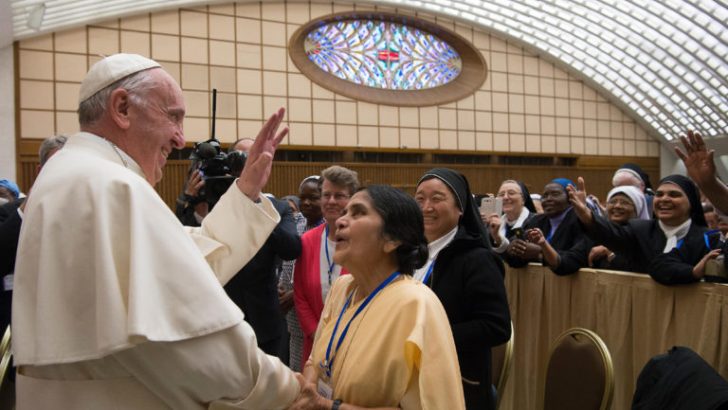Lack of past practice suggests Pope won’t make profound change, writes David Quinn
Pope Francis appears to have poured cold water for the time being on the idea of women deacons, or at least of something equivalent to the male deaconate.
The Pope had established a commission in 2016 to examine the issue. It was to report on whether or not women were ordained to the deaconate in the early Church.
We know that the Church claims it has no authority to ordain women as priests, but it has said nothing definitive on whether or not it can ordain women as deacons. Perhaps it could do this, and perhaps for some this might be a giant step towards eventually going the full way and ordaining women as priests also? But theoretically speaking, it would be possible to ordain women as deacons and stop there.
A crucial question is whether there was ever a tradition in the Church of ordaining female deacons in the same way that men were ordained as deacons. This would involve a careful examination of the Church’s history, especially its early history. This is what the commission established by Francis did.
The commission has now made its report to Francis and he has now indicated that its deliberations were inconclusive. He told journalists on the flight back from North Macedonia: “The formulas of female deacon ‘ordination’ found until now, according to the commission, are not the same for the ordination of a male deacon and are more similar to what today would be the abbatial blessing of an abbess.”
That is to say, the commission members have gone through the historical records and so far these seem to indicate that female deacons were not ordained in the same way as men, but received a blessing to carry out certain ministries to other women, such as baptism.
Reality
In the early Church there were many adult baptisms (as there still are in various parts of the world today) and baptisms sometimes took place with the candidates fully disrobed. That brought up obvious questions around decorum. A woman in such circumstances might be embarrassed to be baptised by a man.
In reality, the commission was almost certainly not going to arrive at a definite conclusion when it consisted of members for and against women deacons. Each member will now continue to promote their favourite theory about the matter, just as they did before.
In simply saying that the commission has not been able to reach a conclusion, the Pope has cleverly defused a potentially explosive issue. He has probably taken heed of the huge outcry that followed when Pope Paul VI in his papal encyclical, Humanae Vitae, reiterated the Church’s ban on the use of artificial contraception.
Pope John XXIII had established a commission to investigate the matter and hopes were raised that Church teaching would change. The commission was established not long after the invention of the contraceptive pill as the sex revolution got underway.
A majority of members recommended a change to Church teaching. This raised hopes even higher and Pope Paul dashed them with his encyclical. Many Catholics decided they no longer trusted the teaching authority of the Church.
However, if Pope Paul had gone along with the commission, this would have happened anyway. If the Church had been so wrong for so long about such an important issue, couldn’t it be wrong about a lot of other things also?
On this occasion, Francis was fortunate in that the commission on women deacons arrived at no conclusion. Therefore, he didn’t have to say yea or nay to a conclusion.
If the commission had determined that women could be ordained as deacons the same as men, and Francis rejected the conclusion, this would have generated angry headlines worldwide as another snub to women.
But if he had accepted the conclusion, many traditionalists would have seen it as a step on the road to women priests, something the Church has repeatedly said cannot happen, and he would have caused anger anyway.
“Francis speaks a lot about collegiality, that is, moving together with the bishops”
So, he seems to have decided to make no dramatic announcement at all. Instead he almost casually told reporters on board the papal plane that the commission arrived at no conclusion which seems to mean the status quo remains.
Francis can easily be accused of a degree of cynicism on the issue. Shouldn’t he be guided by principle instead and not (it would seem) by mostly pragmatic considerations?
It is possible, of course, that he might simply announce out of the blue that there will be women deacons, and they will be the same as male deacons. But Francis speaks a lot about collegiality, that is, moving together with the bishops of the world, and if there is no clear indications that the Church ever had a tradition of ordaining women deacons in the same way as male deacons, he would be breaking with the seeming tradition of the Church.
Francis does have a reputation for tearing up the rule book of the Church, but he mostly does this on matters of procedure. Perhaps, as his papacy goes on, he is showing himself to be a small ‘c’ conservative, or is that a small ‘l’ liberal? Or maybe he is simply a Catholic.


 David Quinn
David Quinn Pope Francis greets a nun during an audience with the heads of women’s
religious orders in Paul VI Hall. Photo Credit: (CNS / L’Osservatore Romano)
Pope Francis greets a nun during an audience with the heads of women’s
religious orders in Paul VI Hall. Photo Credit: (CNS / L’Osservatore Romano) 